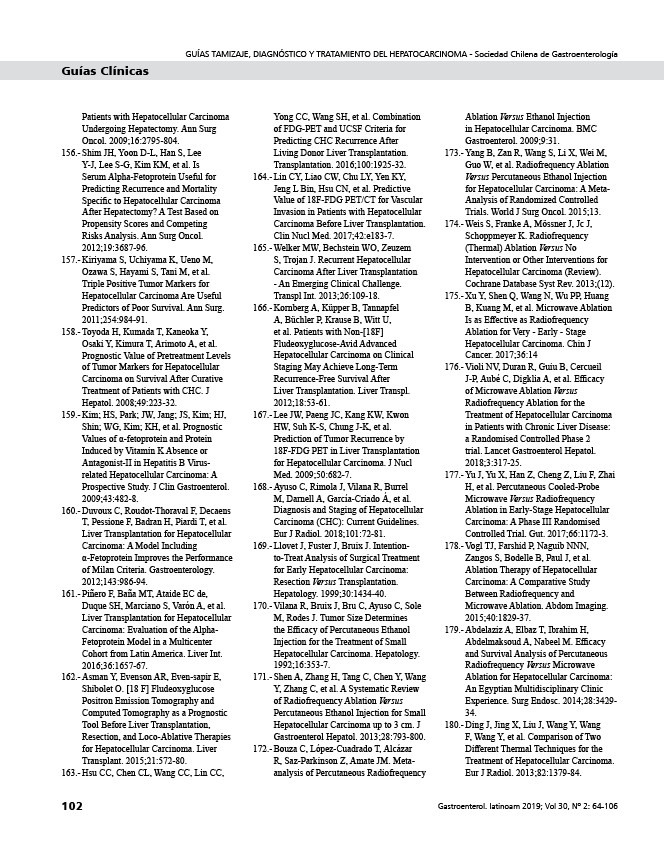
Guías Clínicas
Guías tam izaje, d iagn óstico y tratam ien to de l hepa toca rcinoma - Sociedad Chilena de Gastroenterología
Patients with Hepatocellular Carcinoma
Undergoing Hepatectomy. Ann Surg
Oncol. 2009;16:2795-804.
156.- Shim JH, Yoon D-L, Han S, Lee
Y-J, Lee S-G, Kim KM, et al. Is
Serum Alpha-Fetoprotein Useful for
Predicting Recurrence and Mortality
Specific to Hepatocellular Carcinoma
After Hepatectomy? A Test Based on
Propensity Scores and Competing
Risks Analysis. Ann Surg Oncol.
2012;19:3687-96.
157.- Kiriyama S, Uchiyama K, Ueno M,
Ozawa S, Hayami S, Tani M, et al.
Triple Positive Tumor Markers for
Hepatocellular Carcinoma Are Useful
Predictors of Poor Survival. Ann Surg.
2011;254:984-91.
158.- Toyoda H, Kumada T, Kaneoka Y,
Osaki Y, Kimura T, Arimoto A, et al.
Prognostic Value of Pretreatment Levels
of Tumor Markers for Hepatocellular
Carcinoma on Survival After Curative
Treatment of Patients with CHC. J
Hepatol. 2008;49:223-32.
159.- Kim; HS, Park; JW, Jang; JS, Kim; HJ,
Shin; WG, Kim; KH, et al. Prognostic
Values of α-fetoprotein and Protein
Induced by Vitamin K Absence or
Antagonist-II in Hepatitis B Virusrelated
102
Hepatocellular Carcinoma: A
Prospective Study. J Clin Gastroenterol.
2009;43:482-8.
160.- Duvoux C, Roudot-Thoraval F, Decaens
T, Pessione F, Badran H, Piardi T, et al.
Liver Transplantation for Hepatocellular
Carcinoma: A Model Including
α-Fetoprotein Improves the Performance
of Milan Criteria. Gastroenterology.
2012;143:986-94.
161.- Piñero F, Baña MT, Ataide EC de,
Duque SH, Marciano S, Varón A, et al.
Liver Transplantation for Hepatocellular
Carcinoma: Evaluation of the Alpha-
Fetoprotein Model in a Multicenter
Cohort from Latin America. Liver Int.
2016;36:1657-67.
162.- Asman Y, Evenson AR, Even-sapir E,
Shibolet O. 18 F Fludeoxyglucose
Positron Emission Tomography and
Computed Tomography as a Prognostic
Tool Before Liver Transplantation,
Resection, and Loco-Ablative Therapies
for Hepatocellular Carcinoma. Liver
Transplant. 2015;21:572-80.
163.- Hsu CC, Chen CL, Wang CC, Lin CC,
Yong CC, Wang SH, et al. Combination
of FDG-PET and UCSF Criteria for
Predicting CHC Recurrence After
Living Donor Liver Transplantation.
Transplantation. 2016;100:1925-32.
164.- Lin CY, Liao CW, Chu LY, Yen KY,
Jeng L Bin, Hsu CN, et al. Predictive
Value of 18F-FDG PET/CT for Vascular
Invasion in Patients with Hepatocellular
Carcinoma Before Liver Transplantation.
Clin Nucl Med. 2017;42:e183-7.
165.- Welker MW, Bechstein WO, Zeuzem
S, Trojan J. Recurrent Hepatocellular
Carcinoma After Liver Transplantation
- An Emerging Clinical Challenge.
Transpl Int. 2013;26:109-18.
166.- Kornberg A, Küpper B, Tannapfel
A, Büchler P, Krause B, Witt U,
et al. Patients with Non-18F
Fludeoxyglucose-Avid Advanced
Hepatocellular Carcinoma on Clinical
Staging May Achieve Long-Term
Recurrence-Free Survival After
Liver Transplantation. Liver Transpl.
2012;18:53-61.
167.- Lee JW, Paeng JC, Kang KW, Kwon
HW, Suh K-S, Chung J-K, et al.
Prediction of Tumor Recurrence by
18F-FDG PET in Liver Transplantation
for Hepatocellular Carcinoma. J Nucl
Med. 2009;50:682-7.
168.- Ayuso C, Rimola J, Vilana R, Burrel
M, Darnell A, García-Criado Á, et al.
Diagnosis and Staging of Hepatocellular
Carcinoma (CHC): Current Guidelines.
Eur J Radiol. 2018;101:72-81.
169.- Llovet J, Fuster J, Bruix J. Intentionto
Treat Analysis of Surgical Treatment
for Early Hepatocellular Carcinoma:
Resection Versus Transplantation.
Hepatology. 1999;30:1434-40.
170.- Vilana R, Bruix J, Bru C, Ayuso C, Sole
M, Rodes J. Tumor Size Determines
the Efficacy of Percutaneous Ethanol
Injection for the Treatment of Small
Hepatocellular Carcinoma. Hepatology.
1992;16:353-7.
171.- Shen A, Zhang H, Tang C, Chen Y, Wang
Y, Zhang C, et al. A Systematic Review
of Radiofrequency Ablation Versus
Percutaneous Ethanol Injection for Small
Hepatocellular Carcinoma up to 3 cm. J
Gastroenterol Hepatol. 2013;28:793-800.
172.- Bouza C, López-Cuadrado T, Alcázar
R, Saz-Parkinson Z, Amate JM. Metaanalysis
of Percutaneous Radiofrequency
Ablation Versus Ethanol Injection
in Hepatocellular Carcinoma. BMC
Gastroenterol. 2009;9:31.
173.- Yang B, Zan R, Wang S, Li X, Wei M,
Guo W, et al. Radiofrequency Ablation
Versus Percutaneous Ethanol Injection
for Hepatocellular Carcinoma: A Meta-
Analysis of Randomized Controlled
Trials. World J Surg Oncol. 2015;13.
174.- Weis S, Franke A, Mössner J, Jc J,
Schoppmeyer K. Radiofrequency
(Thermal) Ablation Versus No
Intervention or Other Interventions for
Hepatocellular Carcinoma (Review).
Cochrane Database Syst Rev. 2013;(12).
175.- Xu Y, Shen Q, Wang N, Wu PP, Huang
B, Kuang M, et al. Microwave Ablation
Is as Effective as Radiofrequency
Ablation for Very ‑ Early ‑ Stage
Hepatocellular Carcinoma. Chin J
Cancer. 2017;36:14
176.- Violi NV, Duran R, Guiu B, Cercueil
J-P, Aubé C, Digklia A, et al. Efficacy
of Microwave Ablation Versus
Radiofrequency Ablation for the
Treatment of Hepatocellular Carcinoma
in Patients with Chronic Liver Disease:
a Randomised Controlled Phase 2
trial. Lancet Gastroenterol Hepatol.
2018;3:317-25.
177.- Yu J, Yu X, Han Z, Cheng Z, Liu F, Zhai
H, et al. Percutaneous Cooled-Probe
Microwave Versus Radiofrequency
Ablation in Early-Stage Hepatocellular
Carcinoma: A Phase III Randomised
Controlled Trial. Gut. 2017;66:1172-3.
178.- Vogl TJ, Farshid P, Naguib NNN,
Zangos S, Bodelle B, Paul J, et al.
Ablation Therapy of Hepatocellular
Carcinoma: A Comparative Study
Between Radiofrequency and
Microwave Ablation. Abdom Imaging.
2015;40:1829-37.
179.- Abdelaziz A, Elbaz T, Ibrahim H,
Abdelmaksoud A, Nabeel M. Efficacy
and Survival Analysis of Percutaneous
Radiofrequency Versus Microwave
Ablation for Hepatocellular Carcinoma:
An Egyptian Multidisciplinary Clinic
Experience. Surg Endosc. 2014;28:3429-
34.
180.- Ding J, Jing X, Liu J, Wang Y, Wang
F, Wang Y, et al. Comparison of Two
Different Thermal Techniques for the
Treatment of Hepatocellular Carcinoma.
Eur J Radiol. 2013;82:1379-84.
Gastroenterol. latinoam 2019; Vol 30, Nº 2: 64-106